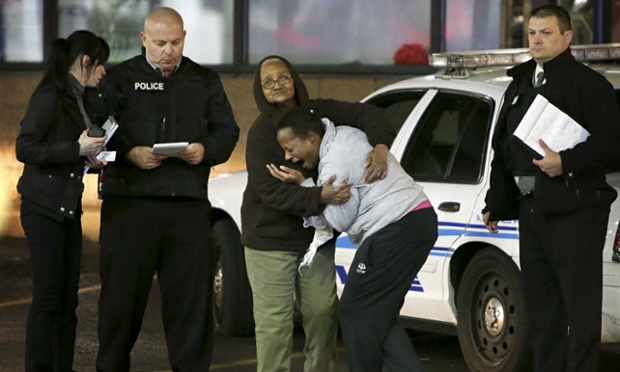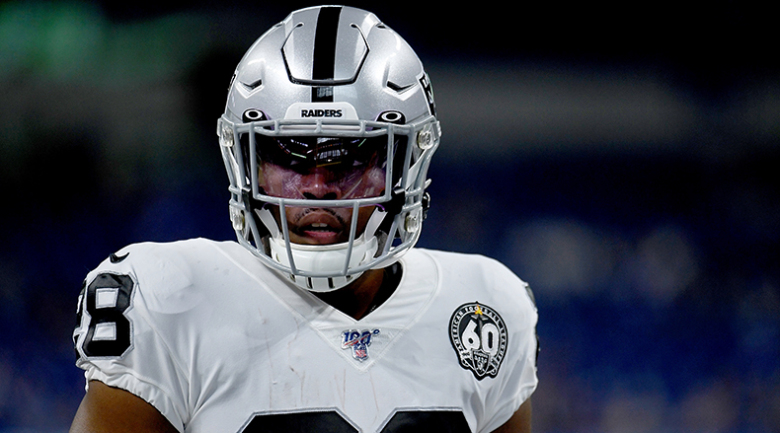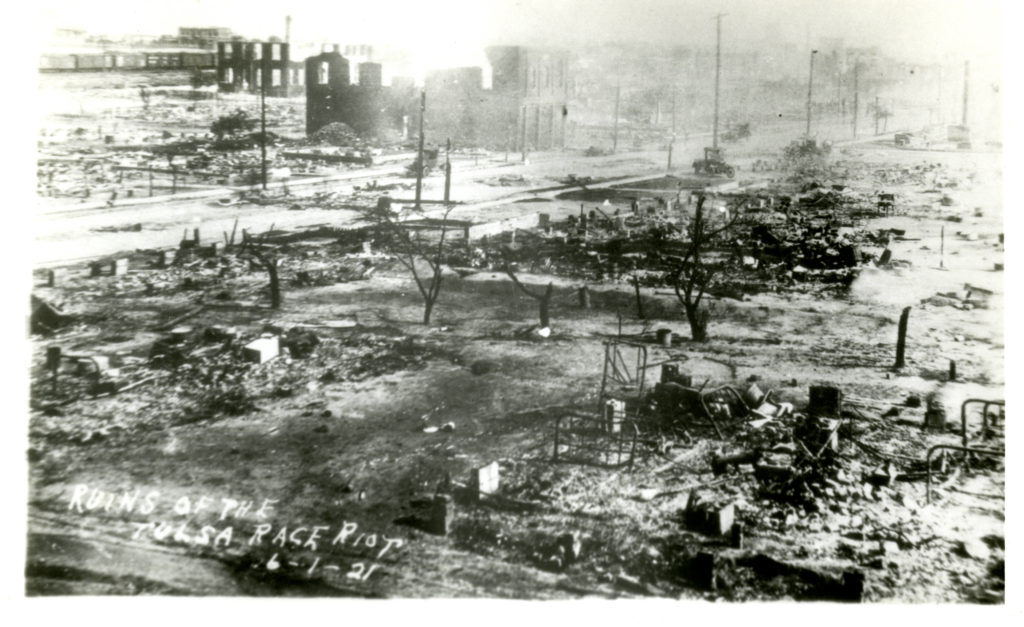
By A. Rochaun Meadows-Fernandez
Between Covid-19 and police brutality, the burden of grief is yet another risk to Black mothers’ health.
When one of us loses a child, all of us feel that hurt; vicarious trauma is an integral aspect of Black motherhood.
My grandmother raised children in the legacy of Mamie Till-Mobley, the mother of 14-year-old Emmett Till, who was kidnapped, beaten, mutilated, and dumped in the Tallahatchie River in 1955. My mother grew up in the shadow of Till and the 16th Street Baptist Church bombings, where four Black young girls were killed and many others injured in what was the third bombing in 11 days in 1963. And in a sick twist of fate, I’ve had to carry them all — including the fears of my children becoming the next Trayvon, Tamir, or Aiyana.
:no_upscale()/cdn.vox-cdn.com/uploads/chorus_asset/file/20005797/GettyImages_450873091.jpg)
These days I turn on the news and I am faced with the murders of Ahmaud Arbery and Breonna Taylor — young unarmed Black people at the hands of armed, white men, both in uniform and plainclothes. Then there is the death of George Floyd, who died after several minutes of saying, “I can’t breathe,” pleading for a police officer to stop pressing a knee into the back of his neck during an arrest. I carry these children, too.
On top of that, I worry about the coronavirus. Black Americans are dying of Covid-19 at a rate nearly three times higher than white people. I also think about masks. When unmasked, we Black mothers fear our loved ones will suffer from the risks associated with complications from the disease. When masked, we fear the risks associated with complications of bias and racism.
As Black mothers, we are living in an especially troublesome time — sandwiched between the current public health threat of Covid-19 and the longtime reality of police brutality. We are trapped in a double-bind of racism.
While there’s an influx of “pandemic grief guides,” none are useful in teaching Black children that the virus is terrifying, but that racism is the public health crisis more likely to kill you. There are no instructions about where Black mothers are supposed to place their fears and sorrow.
As Black mothers, grief is embedded in our being. It accumulates and manifests as body aches and pains. But many of us have never been taught how to deal with it so it doesn’t become yet another risk to our health.
The emotional and physical burden of trauma on Black mothers’ bodies
Growing up, when my family experienced anti-Black racism from the outside world, or disrespect from men within our orbit, I used to be upset that no woman in my family had modeled authentic hurt. But now that I have two children of my own, I understand. Unattended grief is heavy and slows one down. Black mothers don’t have time to spare. My mother chose to teach me what I needed to survive.
What I did learn from my mother about grief was to cloak it in irritation. I can disassociate so skillfully that the untrained eye has no idea that my stoic expressions and firm tone stand in for the overwhelming fears I have. I fear the day my 4-year-old son will stop being “so cute” and become “so scary.” I’m terrified that my daughter or I will be the next Black woman or girl killed in what should be the safety of our home. And so I pretend that everything is fine and deal with my stressed-induced muscle spasms silently.
Kelly Glass, a mother of two Black boys, was initially relieved to have her sons home during the pandemic. It meant she didn’t have to worry about them being criminalized at school or some other public place.
“I almost resented the way that white parents spoke of self-isolation with such grief,” she said, referring to the stay-at-home orders. “It reminded me that as a Black mother, I’ve always been acutely aware of the dangers in this world that are out there for my children just for existing.”
I’m personally acquainted with this state of hyperawareness, she described — a persistent fear that the smallest interaction can trigger a sequence of events leaving them unsafe.
This fear is another stress added to the generation of stresses that many Black bodies feel.
“Weathering is the term that was coined to describe how racism causes our health to worsen. It leads to higher rates of diabetes and high blood pressure,” Dr. Joia Adele Crear-Perry, president of the National Birth Equity Collaborative, told Vox.
Black Americans between ages 35 and 64 are 50 percent more likely to have high blood pressure, three times more likely to have kidney failure, and 60 percent more likely to have diabetes than their white peers. These are all conditions that leave us more vulnerable to Covid-19, too.
“The collective PTSD we will all have when this pandemic is over has only heightened the stressors Black women faced pre-pandemic,” Crear-Perry says.
Then compound those stressors with being a mother.
Early this year, Cynthia G. Colen, associate professor at the Department of Sociology Ohio State University, published perhaps the first study to suggest that children’s exposure to discrimination can harm their mothers’ health. The research, which examined 40 years of self-reported data from mother-child pairs — 3,004 mothers and 6,562 children — illustrated the intergenerational nature of adverse health effects.
Researchers noted that Black and Hispanic mothers exist in a state of “high alert to the possibility that their child will encounter unfair treatment” and the potential consequences of this stress are factors like slower blood pressure recovery, increases in inflammatory markers, and worse sleep patterns.
Colen and the team found that “by age 50, 31 percent of blacks reported having fair or poor health, compared to 17 percent of whites and 26 percent of Hispanics, and that mothers of children reporting moderate or high levels of acute discrimination were up to 22 percent more likely to face a decline in their health between age 40 and 50 than mothers whose children did not.”
When asked about the importance of her research in today’s context, Colen highlighted the role images of Black death have in accelerating Black mothers’ aging and health deterioration. She notes that racism and racial inequality have substantial consequences on the health of Black women and mothers — with the clearest manifestation being the “never-ending hypervigilance” that we need to survive in a society that was founded on our subjugation.
“The recent deaths of Ahmaud Arbery and Breonna Taylor are a brutal reminder that no matter how vigilantly Black mothers try to protect their children, or other family members, it might not be enough to ensure their safety,” Colen said.
In order to heal, we must process
Expressing grief is one of the few coping tools that Black mothers can call upon to help navigate the stressors of the world. But when we miss out on the opportunity to do so — an understandable decision considering the constant flow of traumatic stories that we’re exposed to — our health suffers.
Amber Hewitt, a counseling psychologist with expertise in racial identity and coping, says it’s necessary to “get real with” our emotions for the healing process to begin.
“The trauma narrative, as we call in it psychology, is a powerful technique designed to help survivors of trauma to make sense of their experiences. Sharing your trauma story helps you to organize the memories related to the trauma, and it even helps lessen the painful emotions that go along with it,” she says.
We saw the trauma narrative in action in Till-Mobley’s willingness to grieve publicly and have an open casket funeral for her son Emmitt, which kickstarted a movement that allowed 50,000 people to visualize the impact of white violence on Black families.
:no_upscale()/cdn.vox-cdn.com/uploads/chorus_asset/file/20005816/GettyImages_514962432.jpg)
Just as Till-Mobley used her grief as a tool of system change, Trayvon Martin’s mother, Sybrina Fulton, has channeled the legacy of community and grief as a resource for support. Her organization, Circle of Mothers, provides an opportunity for mothers who have lost loved ones to gun violence to find empowerment and healing through community.
Today, there are others creating safe practices and spaces for Black mothers to let go of their grief and share their experiences.
Alexis Flanagan, co-director of Resonance Network, says that connection and community are necessary tools to dismantle oppressive structures and create the violence-free world where all — particularly groups who have disproportionately suffered, like Black and Indigenous womxn and girls — finally have equal opportunity to thrive.
Recently, Resonance Network organized an online grief circle that used the knowledge of ancestral practices and wisdom as a blueprint for healing. “Wailing circles are ancestral practices that provide critical care, especially in moments like these … spaces to express our grief and loss as we call the names of those who are sick, those who have died, and those who have been killed,” explained ML Daniel of Spiritual Alchemy and Rebeka Ndosi of Healing Illuminated, who helped facilitate Resonance Network’s 90-minute virtual offering.
Trina Greene Brown started Parenting for Liberation as a space where Black parents could shift harmful narratives through community, dialogue, and reflection. She is concerned about the impact trauma and suffering is having on the wellness of Black families, especially during Covid-19.
“Black mothers require these healing resources because of the pre-existing disparities in access to both physical and mental health resources, coupled with the added pressures of round-the-clock caregiving, financial uncertainty, school closures, and social isolation that is uniquely impacting Black mothers,” Greene Brown says.
In response, she developed “Care for the Caregivers,” a wellness fund, in partnership with The Well, that makes individual and couples coaches available to Black parents and caregivers virtually and free of charge.
The spots filled swiftly – every applicant was a Black mother – making it clear that Black women are interested in doing the work of resolving trauma. But when it comes to everyday and widespread access, systemic and financial barriers like lack of insurance, limited availability of mental health providers of color, and the demands of daily caretaking complicate the process of Black mothers receiving help.
For me, it took six counselors and paying for teletherapy out of pocket to locate a mental health professional — another Black mother — who I could trust and afford.
Between sessions, my Black momma friends and I share our fears of raising Black boys and girls in a racist, sexist world. I’m also working to grow a social movement called #FreeBlackmotherhood to encourage Black mothers to emphasize authentic emotions, both negative and positive. And while I’ve accepted that my mother rarely verbalized grief, she did show me rituals to help – hot baths to soothe muscles that ached from stress, encouragement to play as hard as I work, and a suggestion to pray over the things I can’t control.
Hewitt says these rituals have a long history as coping tools in Black families. But Black mothers must learn to care for themselves the way they care for others.
“Black mothers should turn those same techniques on to themselves,” she says. “It should not be considered an act of self-indulgence, but part of a practice to show self-love.”
A. Rochaun Meadows-Fernandez is an award-winning writer, speaker, and activist working to amplify Black women’s voices in the mainstream dialogue, especially within conversations on health and parenting. She is also the founder of the #FreeBlackmotherhood movement.
Support Vox’s explanatory journalism
Every day at Vox, we aim to answer your most important questions and provide you, and our audience around the world, with information that has the power to save lives. Our mission has never been more vital than it is in this moment: to empower you through understanding. Vox’s work is reaching more people than ever, but our distinctive brand of explanatory journalism takes resources — particularly during a pandemic and an economic downturn. Your financial contribution will not constitute a donation, but it will enable our staff to continue to offer free articles, videos, and podcasts at the quality and volume that this moment requires. Please consider making a contribution to Vox today.










